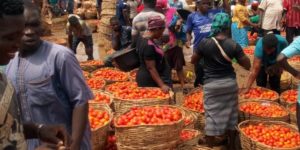A few things have caught my interest since this lockdown. For some of them, I have tried to move beyond being interested to researching further about them – startups, food scarcity leading to increased cost among other things.
Food security has particularly worried me as the prices of farm produce continue to increase after each market day. What is responsible? How can we mitigate against further increase and impending scarcity?
The Wuhan Virus pandemic and the enforcement of the lockdown are largely responsible. The surge in food prices across the country are linked to the logistical bottlenecks of transporting products between states. Smallholder farmers are suffering the effects of the restrictions in market and retail activities in most states as most perishable goods get spoilt before the usual offtakers come. We have seen, on various social media platforms, farmers seeking buyers for their products at drastically reduced prices – eggs, poultry products, cucumbers, watermelons, onions, etc. In the wake of this crisis, both the Federal and several state governments have “decreed” measures for the containment and management of the virus. Plausible as these measures are, neither the federal, nor state governments, have put in place palliatives to safeguard access to food. The distribution of farm products has thus become very difficult.
The enforcement of travel restrictions has resulted in clashes between authorities & civilians. With the restriction of movement, farmers are forced to seek alternative routes, most times using bad roads. In the absence of any legislation covering them, they have resorted to bribing authorities while many truck drivers who commute farm products have taken to dangerous night travels to meet supply demands. These challenges of distribution in the supply chain are manifested in the rising cost to consumers. Given the short “life span” of perishable goods, the only way farmers try to recoup the losses they incur from the delays, bribes and other means is through price increase.
Again, away from the issues with the regular distribution chain, and far from whatever you may want to think, Nigeria is still largely dependent on imported foods to supplement inadequate local production. While there has been appreciable increase in local production, food imports still take a chunk of our import costs. According to the most recent Nigerian Bureau of Statistics’ data, the importation of foodstuffs and the other items in the first half of 2019 increased by 47% when compared with the corresponding period of 2018. Specifically, in the first half-year of 2018, the importation of prepared foodstuffs, beverages, spirits and vinegar and tobacco was put at N227.1 billion while the figure rose to N334.3 billion in half-year 2019.
A lot of processed foods we consume are imported, most canned products are imported. The devaluation of the Naira occasioned by the collapse of global economic activities has affected imported products. But that is only a part of the story. Value chain players say that the world is about to witness massive food shortage. Farms in the US/UK and other parts of Europe are being destroyed. The opinion is that it is easier and cheaper to destroy them than to harvest them during this period capitalist markets seeking to make gains would rather choose the path of decreased cost. These farm products would normally have been sent to restaurants, and companies who process and ship them to markets. In the absence of ready buyers, destruction is now the option.

The reality is that the near future does not even look bright. The solutions to food shortage and irregular supply chains may not be easily solved as the number of infected persons continues to rise while it appears that the extension of the lockdown is inevitable. Smallholder farmers will still find it hard to sell their products. I however have some suggestions for what I think can be done on the interim:
1. Governments should begin to factor the food chain in their legislation: I know we have terrible law enforcement agents but we can at least do the minimum. Make legislations that will shield the supply trucks from being extorted by greedy security agents on our roads. Alternatively, Agriculture Ministries can takeover the responsibility of moving produce from the farms to market centers where they can easily be accessible.
2. Individuals will need to resort to traditional means of storing perishables like vegetables and tomatoes especially where electricity supply is epileptic.
3. The central Bank’s loan facility at this period should also be targeted towards farmers (low/non-interest).
4. Irrelevant as it may appear, those who have spaces in their compounds can start small gardens for a few perishables to cut cost on some purchases.
The post-Wuhan Virus world will witness lots of innovation in agriculture if we are going to recover quickly enough. This is not a time for hoe and matchet kind of farming. Unfortunately, even the machineries for this innovation are not readily available in Nigeria. It is also difficult to purchase as the world is suffering a production deficit. Available ones will be ramped up by the countries we want to buy from. For the few available, industry experts aver that there will be need for skilled manpower to wiggle through this period.
But will there really be a post-Wuhan Virus world? How soon are we going to see that? How much more people will die of hunger?
The technology required for the future of agriculture is expensive and the technical knowledge to operate them is currently lacking. The near future will be gross for Africa, nay Nigeria. Nigeria’s most important commodity – Oil – is no longer a market mover. For Nigerias kleptocratic elite who have fed fat from the export of our natural resources, this is not the time to wait for a possible rebound of the oil prices. This is a warning shot and a time for serious thinking.
However, I see some opportunities for young people. As I earlier posited, the deployment of technology has become inevitable. The pandemic has necessitated decreased human contacts thus making the use of technological tools necessary to fill the gap left by humans. Knowledge of GIS cartography, the ability to interprete satellite images and its affliliates will be a hot sale for the present future. Drone operations too for fumigation, pest control and for other things. Farms will need data experts for a lot of planning and predictions. How prepared are we? The world will need lots of your skill if you are a young person in tech. For those who currently do not possess the skill but are interested in playing in that sector, it is never late to skill-up.





1 comment
Thanks Nweke for this article. It’s eye opening. Inevitably, technology holds the key to the future.
Meanwhile, I noticed you called covid-19 Wuhan virus. May I know why.
Thanks